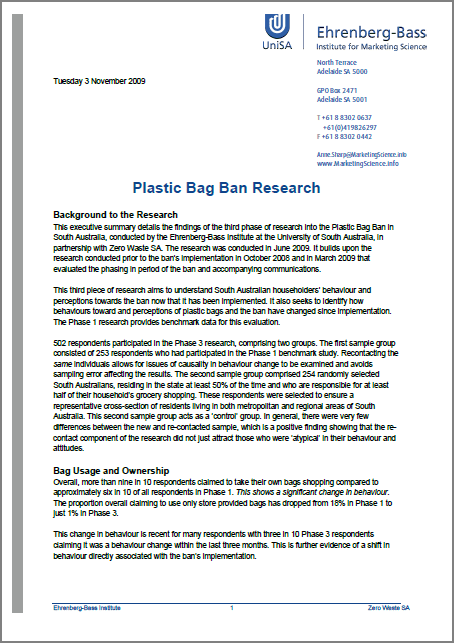
- Single-use plastics
Plastic Bag Ban Research Ehrenberg-Bass Institute (2009)
The research was conducted in June 2009. It builds upon the research conducted prior to the ban’s implementation in October 2008 and in March 2009 that evaluated the phasing in period of the ban and accompanying communications. This third piece of research aims to understand South Australian householders’ behaviour and perceptions towards the ban now that it has been implemented. It also seeks to identify how behaviours toward and perceptions of plastic bags and the ban have changed since implementation.
The Phase 1 research provides benchmark data for this evaluation. 502 respondents participated in the Phase 3 research, comprising two groups. The first sample group consisted of 253 respondents who had participated in the Phase 1 benchmark study. Recontacting the same individuals allows for issues of causality in behaviour change to be examined and avoids sampling error affecting the results.
The second sample group comprised 254 randomly selected South Australians, residing in the state at least 50% of the time and who are responsible for at least half of their household’s grocery shopping. These respondents were selected to ensure a representative cross-section of residents living in both metropolitan and regional areas of South Australia.
This second sample group acts as a ‘control’ group. In general, there were very few differences between the new and re-contacted sample, which is a positive finding showing that the recontact component of the research did not just attract those who were ’atypical’ in their behaviour and attitudes.
Bag Usage and Ownership Overall, more than nine in 10 respondents claimed to take their own bags shopping compared to approximately six in 10 of all respondents in Phase 1. This shows a significant change in behaviour. The proportion overall claiming to use only store provided bags has dropped from 18% in Phase 1 to just 1% in Phase 3.
This change in behaviour is recent for many respondents with three in 10 Phase 3 respondents claiming it was a behaviour change within the last three months. This is further evidence of a shift in behaviour directly associated with the ban’s implementation.




